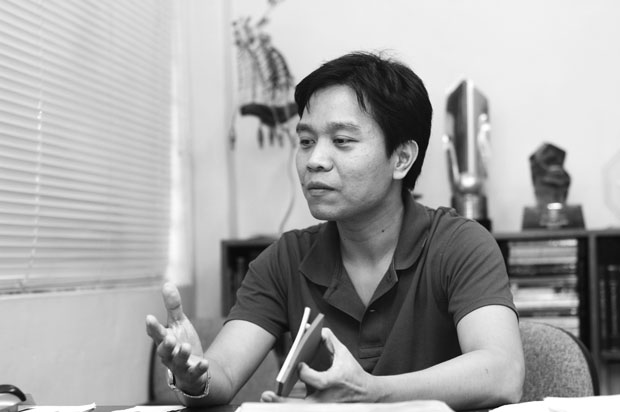
Language of the streets. The discourse of the broad masses of the Filipino people takes place in the vernacular, not in what James Soriano called “the language of the learned.” Photo by Tata L. Yap
In the Philippines, issues of social class have always surrounded language. A lot of times, a considerable number of people from privileged backgrounds often do not feel the need to speak in Filipino, except colloquially, such as in occasions where there is a need to interact with a taho or banana cue vendor. The masses, on the other hand, almost exclusively use the vernacular.
However, the issue of social class in relation to language has once again been brought into the spotlight, ever since the Manila Bulletin published senior management honors major James Soriano’s opinion piece, “Language, learning, identity, privilege,” last August. Much heated debate has ensued over the subject, decrying, among other things, Soriano’s assertion that Filipino is “not the language of the learned.”
Even after the Manila Bulletin published Soriano’s follow-up column, “Wika bilang gunita,” which explained his intentions behind the first article, debate still rages on in the academe about the several issues surrounding language. The varied reactions to the column, ranging from well-reasoned arguments to threats on the author’s character, speak of the high stakes people ascribe to the matter.
Whether the criticisms were based on paragraph construction or personal opinion, the response to the article has been undeniably huge. It now puts the “privileged”—students of the better off schools, academics, professionals—in a complicated position: given their already comfortable situations, how does an issue of language, one that they can arguably survive without, concern them?
This very question exposes the divides marked by—or, as some would argue, even caused by—the barriers of language in the Philippines, and highlights the significant implications of social class on the matter of language.
Within the Ateneo
A short stroll across the campus would attest to the fact that a lot of Ateneans feel more comfortable speaking in English than in Filipino. As much as students would like to break the sheltered kid stereotype usually attached to them, their upbringing is evident in their mannerisms, their accents, and the topics they talk about.
“Kayo sa Ateneo, you’re pretty notorious… I mean even in jokes, it’s the twang that distinguishes you; it’s the kind of English that you do with Lasallians or Assumptionistas,” says distinguished author and academic Rolando Tolentino, Dean of the College of Mass Communication of the University of the Philippines Diliman. “It becomes almost a badge of honor to be distinct from the rest of the Philippine population.”
The jokes seem to be deeply rooted in pop culture, with the “Arrneow accent” being used as a tease on Ateneans as early as renowned alumnus Raul Manglapus’ time. The distinct Atenean twang was, of course, the result of the American Jesuit faculty’s long presence on campus, which lasted until their eventual exit after Filipinization efforts in the ‘70s.
Cultural roots
“[English] is really a colonial language, which means it will always be tied to the imagination of that kind of colonial structure,” Tolentino says. “We’re probably one of the few countries in the world which do not have subtitles for Hollywood films, because we appreciate Hollywood films in all its Englishness and the non-mediation of Filipino or a local language.”
Tolentino believes that the barrier of language among the social classes is an issue of education. Pointing to the general Atenean proficiency in English, he says, “It’s really a marker of a kind of elitism in the country.”
This is one point where the issue of social class cannot be missed; while fluency in English is usually marketed as a gateway to employment (and therefore, out of poverty), the odds that one is fluent in English is much higher for those who are already in the upper classes of society in the first place.
This can be seen in the way Soriano paid special attention to his upbringing in the column: how, for example, he only regularly used Filipino in his interaction with the house help or with the driver, while he used English for talking to his parents or for praying to God. He read English books and listened to English songs while growing up.
This betrays the fact that while English education in the country is universal in theory, this does not equate to universal proficiency. This seems to depend more on environmental factors and on the presence of opportunities for actual use than on the quality of instruction.
“Definitely, if you’re of the upper class, then there would be less use of Filipino in your everyday life, except to talk to the underclass,” Tolentino says, sharing Soriano’s analysis of language. “And if you’re underclass, and you aspire to become part of the [upper] class, then you would view English as a kind of equipment or as a kind of tool for your own social mobility.”
However, Tolentino disagrees with how the essay “sidetracks people… who did not benefit from English as a way of understanding the world in this country.”
“There’s something really contemptuous in the way the essay was written,” he says. He explains that while he understands that Soriano “was speaking his mind from his own unique background,” he believes that he is speaking from a “prejudicial kind of experience” that is biased against “that 99.9% who were not able to go to Ateneo.”

A matter of literacy. “If you want to talk about social class in language, the dichotomy that must be focused on is colloquialism versus intellectualism,” says Alvin Yapan. Photo by Migi C. Soriano
Colloquialism vs. intellectualism
Filipino Department chair Alvin Yapan reaffirms that there is a clear connection between language and social class, but approaches the matter from a different vantage point.
“There really is a connection between language and the class that you belong to… but perhaps not in the way James Soriano gave definition to it,” he says in Filipino. “For him, your class is contingent to the kind of language you use.”
For Yapan, the analysis of language’s relation to social class must be anchored on the issue of literacy.
“It’s not a question of whether someone speaks in Filipino or in English, but whether one’s use of language is colloquial or one’s use of it is intellectualized,” he says. “By chance, you might have been born to a family whose first language is English, but whose use of it is not academic or intellectual—that’s just the same as a Filipino who speaks in Filipino, but whose use of the language is also not intellectual.”
“If you want to talk about social class in language, the dichotomy that must be focused on is colloquialism versus intellectualism,” he says, disagreeing with Soriano’s “binaries” of English and Filipino.
For Yapan, this is the way that social class affects the discourse of language: since it all boils down to the issue of literacy, the question of inequalities, such as in education, remains. “Here in the Philippines, when we talk about literacy, we cannot avoid the issue of class, because who only gets to study anything at all but those who have the money?”
Looking back, speaking forward
Yapan says, “I am not happy that this [opinion piece] came from an Atenean, and I am even more saddened by the fact that this column came from an Atenean who is a member of Heights.”
Heights is the official student literary publication of the Ateneo, and Soriano is currently its Associate Editor. Yapan was also a member of Heights during his college days.
He urges Ateneans to explore the contributions of the university, and specifically of Heights, towards the development of the national language. “You need to take a look at the history of Heights as an organization here in the Ateneo. They started what is called ‘Kilusang Bagay,’ the Bagay movement in literature.”
“What this movement fought for was the use of Filipino in an intellectual way in order to speak to the masses,” he says. “Heights released a manifesto of the Bagay movement, and it is written there that Filipino is the language that should be used.”
He expresses disappointment in the fact that someone “from Heights, of all places,” is advancing the stereotype of the Atenean as elitist and “Inglisero lamang,” at the expense of the university’s efforts and contributions towards developing the national language.
For him, it is problematic that Soriano “blames his family, blames his education, [and] blames his culture” for his circumstances. “It’s not just the fault of your society or culture, or your family, or your education that we are the way we are.”
“It’s easy to say that, and that’s always the case,” he says. “But, exactly that—what can you do as an individual to change this, especially since you’re an Atenean?”
Editor’s Note: James Soriano and Heights Editor-in-Chief Joseph Immanuel Casimiro declined the request for an interview.






